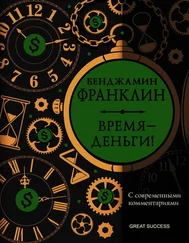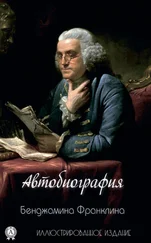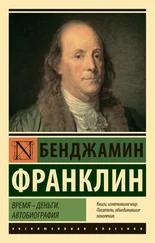Бенджамин Франклин - Franklin's Autobiography
Здесь есть возможность читать онлайн «Бенджамин Франклин - Franklin's Autobiography» — ознакомительный отрывок электронной книги совершенно бесплатно, а после прочтения отрывка купить полную версию. В некоторых случаях можно слушать аудио, скачать через торрент в формате fb2 и присутствует краткое содержание. Издательство: Иностранный паблик, Жанр: История, foreign_antique, foreign_prose, на английском языке. Описание произведения, (предисловие) а так же отзывы посетителей доступны на портале библиотеки ЛибКат.
- Название:Franklin's Autobiography
- Автор:
- Издательство:Иностранный паблик
- Жанр:
- Год:неизвестен
- ISBN:нет данных
- Рейтинг книги:3 / 5. Голосов: 1
-
Избранное:Добавить в избранное
- Отзывы:
-
Ваша оценка:
- 60
- 1
- 2
- 3
- 4
- 5
Franklin's Autobiography: краткое содержание, описание и аннотация
Предлагаем к чтению аннотацию, описание, краткое содержание или предисловие (зависит от того, что написал сам автор книги «Franklin's Autobiography»). Если вы не нашли необходимую информацию о книге — напишите в комментариях, мы постараемся отыскать её.
Franklin's Autobiography — читать онлайн ознакомительный отрывок
Ниже представлен текст книги, разбитый по страницам. Система сохранения места последней прочитанной страницы, позволяет с удобством читать онлайн бесплатно книгу «Franklin's Autobiography», без необходимости каждый раз заново искать на чём Вы остановились. Поставьте закладку, и сможете в любой момент перейти на страницу, на которой закончили чтение.
Интервал:
Закладка:
This obscure family of ours was early in the Reformation, and continued Protestants through the reign of Queen Mary, 12 12 Who was queen from 1553 to 1558.
when they were sometimes in danger of trouble on account of their zeal against the queen's religion. They had got an English Bible, and to conceal and secure it, it was fastened open with tapes under and within the cover of a joint stool. 13 13 "Joint stool," i.e., a stool made of parts fitted together.
When my great-great-grandfather read it to his family, he turned up the joint stool upon his knees, turning over the leaves then under the tapes. One of the children stood at the door to give notice if he saw the apparitor coming, who was an officer of the spiritual court. In that case the stool was turned down again upon its feet, when the Bible remained concealed under it as before. This anecdote I had from my uncle Benjamin.
The family continued all of the Church of England till about the end of Charles II.'s reign, when some of the ministers that had been outed for nonconformity, 14 14 "Outed for nonconformity," i.e., turned out of the church for not conforming to the usages of the Church of England and for holding meetings of dissenters for public worship.
holding conventicles in Northamptonshire, Benjamin and Josiah adhered to them, and so continued all their lives; the rest of the family remained with the Episcopal Church.
Josiah, my father, married young, and carried his wife, with three children, into New England, about 1682. The conventicles having been forbidden by law, and frequently disturbed, induced some considerable men of his acquaintance to remove to that country, and he was prevailed with to accompany them thither, where they expected to enjoy their mode of religion with freedom. By the same wife he had four children more born there, and by a second wife ten more, – in all seventeen, of which I remember thirteen sitting at one time at his table, who all grew up to be men and women and married. I was the youngest son, and the youngest child but two, and was born in Boston, New England. 15 15 Franklin was born Sunday, Jan. 17, 1706 (Jan. 6, old style). The family then lived in a small house on Milk Street, near the Old South Church, where the Boston Post building now stands.
My mother, the second wife, was Abiah Folger, daughter of Peter Folger, one of the first settlers of New England, of whom honorable mention is made by Cotton Mather, in his Church history of that country entitled "Magnalia Christi Americana," as "a goodly learned Englishman," if I remember the words rightly. I have heard that he wrote sundry small occasional pieces, but only one of them was printed, which I saw now many years since. It was written in 1675, in the homespun verse of that time and people, and addressed to those then concerned in the government there. It was in favor of liberty of conscience, and in behalf of the Baptists, Quakers, and other sectaries that had been under persecution, 16 16 The persecution which the first settlers practiced against all who differed with them in religious doctrines.
ascribing the Indian wars, and other distresses that had befallen the country, to that persecution, as so many judgments of God to punish so heinous an offense, and exhorting a repeal of those uncharitable laws. The whole appeared to me as written with a good deal of decent plainness and manly freedom. The six concluding lines I remember, though I have forgotten the two first of the stanza; but the purport of them was that his censures proceeded from good will, and, therefore, he would be known to be the author.
"Because to be a libeler [says he]
I hate it with my heart;
From Sherburne 17 17 Sherburne is now called Nantucket.
town, where now I dwell,
My name I do put here;
Without offense your real friend,
It is Peter Folgier." 18 18 The lines which Dr. Franklin had forgotten are these: "I am for peace and not for war, And that's the reason why I write more plain than some men do, That used to daub and lie. But I shall cease, and set my name To what I here insert, Because to be a libeler I hate it with my heart."
My elder brothers were all put apprentices to different trades. I was put to the grammar school 19 19 In Franklin's time the grammar school was a school for teaching Latin, which was begun by committing the grammar to memory.
at eight years of age, my father intending to devote me, as the tithe of his sons, to the service of the church. My early readiness in learning to read, (which must have been very early, as I do not remember when I could not read,) and the opinion of all his friends that I should certainly make a good scholar, encouraged him in this purpose of his. My uncle Benjamin, too, approved of it, and proposed to give me all his shorthand volumes of sermons, I suppose as a stock to set up with, if I would learn his character. 20 20 Characters, or method of writing shorthand.
I continued, however, at the grammar school not quite one year, though in that time I had risen gradually from the middle of the class of that year to be the head of it, and, further, was removed into the next class above it in order to go with that into the third at the end of the year. But my father in the mean time, from a view of the expense of a college education, which, having so large a family, he could not well afford, and the mean living many so educated were afterward able to obtain, – reasons that he gave to his friends in my hearing, – altered his first intention, took me from the grammar school, and sent me to a school for writing and arithmetic, kept by a then famous man, Mr. George Brownell, very successful in his profession generally, and that by mild, encouraging methods. Under him I acquired fair writing pretty soon, but I failed in the arithmetic, and made no progress in it. At ten years old I was taken home to assist my father in his business, which was that of a tallow chandler and soap boiler, a business he was not bred to, but had assumed on his arrival in New England, and on finding his dyeing trade would not maintain his family, being in little request. Accordingly, I was employed in cutting wick for the candles, filling the dipping mold and the molds for cast candles, 21 21 Candles were made by dipping wicks in the fat a number of times, and also by setting the wicks in a mold and pouring the fat round them.
attending the shop, going of errands, etc.
I disliked the trade, and had a strong inclination for the sea, but my father declared against it. However, living near the water, I was much in and about it, learned early to swim well and to manage boats; and when in a boat or canoe with other boys I was commonly allowed to govern, especially in any case of difficulty; and upon other occasions I was generally a leader among the boys, and sometimes led them into scrapes, of which I will mention one instance, as it shows an early projecting public spirit, though not then justly conducted.
There was a salt marsh that bounded part of the mill pond, on the edge of which, at high water, we used to stand to fish for minnows. By much trampling we had made it a mere quagmire. My proposal was to build a wharf there fit for us to stand upon, and I showed my comrades a large heap of stones which were intended for a new house near the marsh and which would very well suit our purpose. Accordingly, in the evening, when the workmen were gone, I assembled a number of my playfellows, and working with them diligently like so many emmets, 22 22 Ants.
sometimes two or three to a stone, we brought them all away and built our little wharf. The next morning the workmen were surprised at missing the stones, which were found in our wharf. Inquiry was made after the removers; we were discovered and complained of; several of us were corrected by our fathers; and, though I pleaded the usefulness of the work, mine convinced me that nothing was useful which was not honest.
Интервал:
Закладка:
Похожие книги на «Franklin's Autobiography»
Представляем Вашему вниманию похожие книги на «Franklin's Autobiography» списком для выбора. Мы отобрали схожую по названию и смыслу литературу в надежде предоставить читателям больше вариантов отыскать новые, интересные, ещё непрочитанные произведения.
Обсуждение, отзывы о книге «Franklin's Autobiography» и просто собственные мнения читателей. Оставьте ваши комментарии, напишите, что Вы думаете о произведении, его смысле или главных героях. Укажите что конкретно понравилось, а что нет, и почему Вы так считаете.
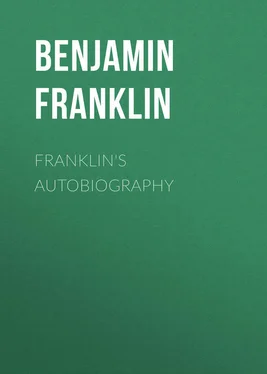


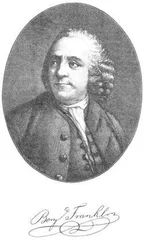

![Бенджамин Франклин - Время – деньги. Автобиография [litres]](/books/397995/bendzhamin-franklin-vremya-dengi-avtobiografiya-thumb.webp)

